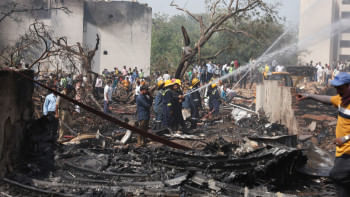Outlook on our economic recovery after Covid-19

The Covid-19 pandemic has affected our lives in several ways. Likewise, it is evident that the pandemic's effect on our country's economy is likely to be detrimental. However, in contrast to many of our neighbouring economies, the revised figures published by the Asian Development Bank (ADB) in June suggest that Bangladesh can still maintain a positive GDP growth over the next couple of years. Therefore, given the current pandemic condition, does this forecast reflect our economic strength in general, or is it an over-optimistic prediction of our country's economic development?
In my view, the current GDP forecasts by the ADB are reasonable and indicate our country's strong economic fundamentals (albeit there is scope for development, just as there is for all other economies). As an example, we can consider the experiences of one of our economy's main sources of foreign income, i.e. the ready-made garment (RMG) sector. Over time, this sector has gained significant value as well as reputation globally, and one can say that its development and our economic growth are positively correlated. However, in 2013, this RMG industry suffered a considerable shock due to the catastrophic collapse of a local garment factory establishment. This incident led to a worldwide negative reaction towards our RMG establishments and prompted a need to make substantial improvements to their work and safety standards.
Subsequently, in the aftermath of this incident, our RMG establishments made large investments in their facilities, at a rapid pace, to ensure that they are on par with international working conditions. In addition to social concerns, these investment outlays were also deemed necessary from an economic perspective as they would allow our garment industry to remain competitive in the global markets. Eventually, having borne significant costs, our RMG sector survived the impact and regained its reputation as well as its market share globally. In fact, today alongside establishing plants that meet international standards, our RMG sector and their exports rank highly among the largest garment exports in the world.
Similar to these events in our RMG industry, I believe our economy can also survive the effects of a financial shock caused by the current pandemic. This is mainly because, like the RMG sector, our economy's major revenue sources are diversified in many different countries and we have gained a favourable reputation regarding the quality of our service output. These factors may indicate sustainable ex-ante benefits (or income) for our country and thereby can rationalise the latest GDP growth outlook suggested by the ADB. To further elaborate, first we can consider our economy's main sources of income. Among others, our economy relies heavily on foreign revenue earned from RMG exports and the remittance inflow from expat workers. At the same time, while our country, like many other neighbouring countries, is still facing a major challenge to overcome the Covid-19 pandemic, the rest of the world is showing significant improvements in curbing this pandemic condition.
This prospect of a positive development in other parts of the world, including the west and the middle east regions, can lead to their own as well as our economic recovery, in tandem. Particularly, in order to stimulate the domestic economy, these regions are likely to take steps that raise the demand for goods and services, at-large. Given that our country has gained a unique position as one of the most reliable suppliers of some of these goods (such as garment for the west) and services (by the expat workers in the middle east), it is expected that the benefits will start to flow to our economy, either directly or indirectly, soon. Therefore, while our economy can face difficulty in the short run due to the current Covid-19 crisis, it is likely to experience a faster recovery when the rest of the world markets start to stabilise and this may be the signal that we can pick up from the latest GDP forecasts by the ADB.
Second, a positive GDP growth outlook also indicates that the total value of the goods and services that we produce within our country is likely to increase. At the same time, this signifies a considerable strength in our domestic economy which is expected to sustain in the foreseeable future. Taken together, this indicator encapsulates the ongoing development of the different sectors of our domestic economy, which may also be apparent in some recent anecdotal evidence.
For instance, nowadays the use of online food ordering and delivery services has grown considerably in our country. As a result, we have seen the development of multiple domestic companies (mainly start-ups) in this line of business, while many established foreign participants have also entered our domestic market. However, surprisingly, in recent times, one of these large foreign entities (i.e. Uber Eats) have had to exit our domestic market, most likely due to profitability concerns, while our local firms remain active. This implies how our domestic firms can sustain the competition from foreign firms and are also able to increase their own market share over time. Therefore, this anecdote can indicate an overall rise in the quality of our local firms and also their significant contribution to our domestic economy, which is reflected in the current positive GDP forecasts.
In summary, considering the current Covid-19 conditions, the positive economic outlook in terms of GDP growth can hint an economic recovery in the near future and can instil a confidence in the economy which, otherwise, investors may lose at the moment. Furthermore, this also suggests that, while a decline under the current pandemic is inevitable, our domestic economy's strong fundamentals can possibly sustain the impact and also help achieve an economic growth especially when the global markets start to recover. In my opinion, this outcome is plausible because historically our economy has experienced several financial shocks which we have been able to withstand. Similarly, it is probable that our economy can recover from the current economic crisis as well, just as our RMG sector did after 2013 along with many other sectors at different time periods.
Md Abdul Wasi is a lecturer of finance at North South University (currently on study leave) and is presently in the final year of his doctoral studies at the University of Adelaide, Australia.
Email: [email protected]

 For all latest news, follow The Daily Star's Google News channel.
For all latest news, follow The Daily Star's Google News channel. 



Comments